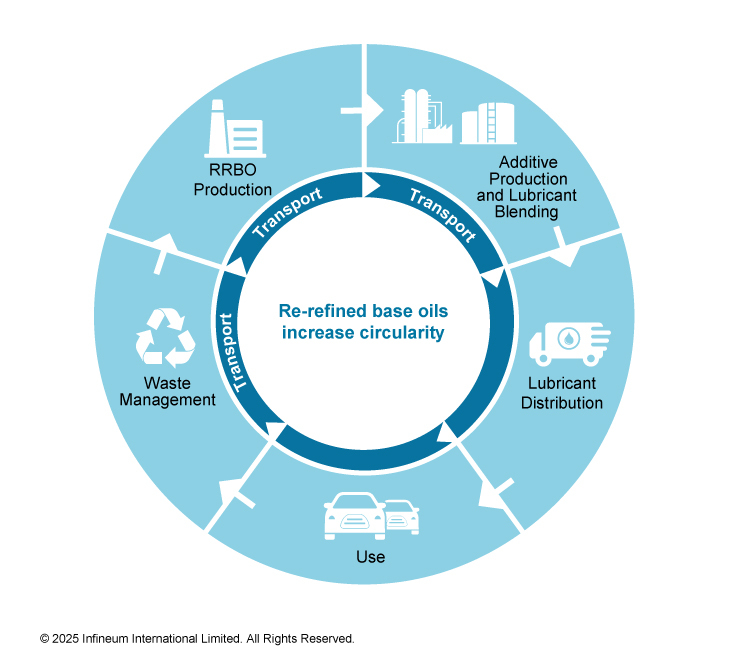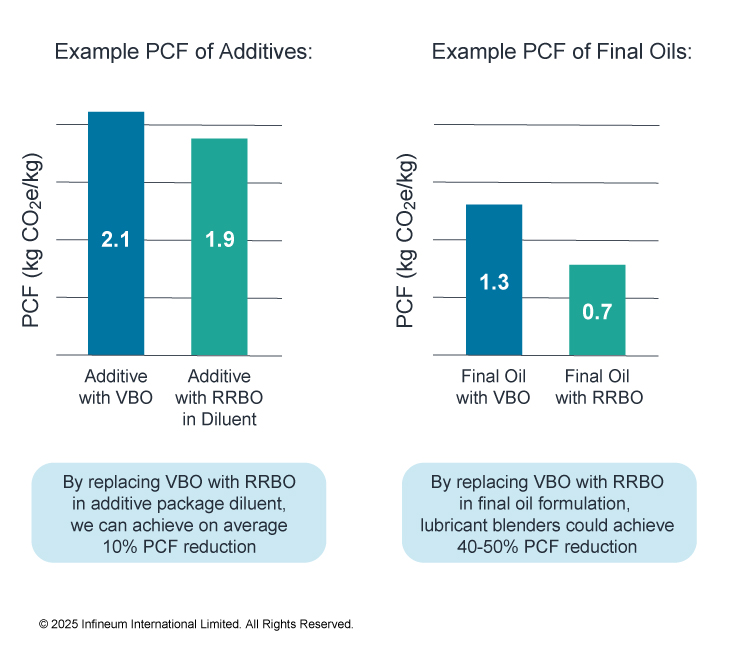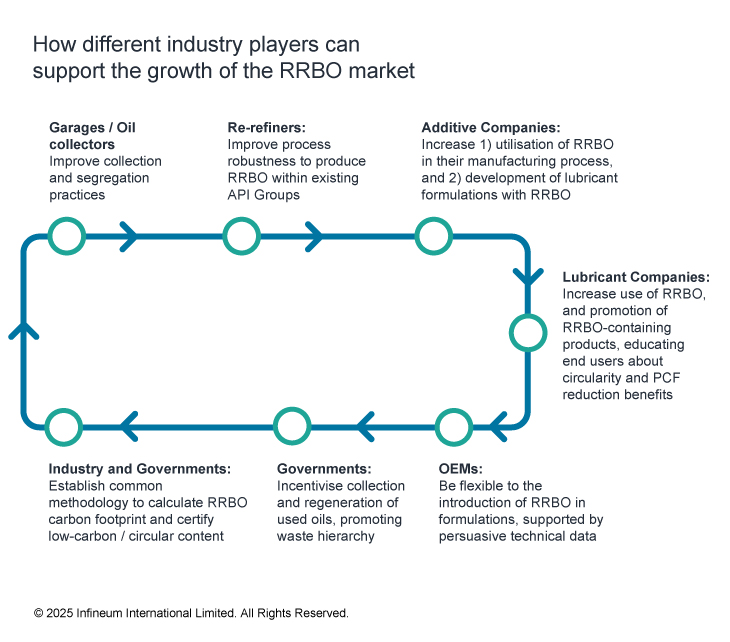Base stocks
ExxonMobil on base stock trends
12 December 2023
08 April 2025
Moving to a more circular model with re-refined base oils

Organisations right across the globe are looking for ways to cut greenhouse gas emissions and reduce dependence on natural resources by applying a more circular approach to their business operations. Zuzana Symmonds, Infineum Commercial Sustainability Business Partner, explores the opportunities offered by re-refined base oils in additive production and lubricant formulations, assesses the drivers and barriers to their wider use and shares Infineum’s thoughts on how their benefits could be further unlocked.
As work to achieve the Paris Agreement to limit global warming continues, we are seeing the world move from a linear economy, one where we take, make, use and dispose, to a more circular economy, where products are designed to be used for longer, are reused and recycled. Adapting to this trend will require significant changes to the way our industries think, work and operate.
In the production of lubricating oils, the linear approach has meant that used oil has been either lost to waste or burnt as energy. However, by collecting more of the available used lubricants and turning them into high quality re-refined base oils (RRBOs), we can move to a more circular model, giving oils a longer useful life and reducing our dependence on finite natural resources.

This is not a new approach but, until recently, only a small proportion of oils have been re-used in this way. But now, as the industry works to achieve its greenhouse gas (GHG) reduction and sustainability ambitions, re-refining is gaining greater attention.
There is a particularly strong case for the use of RRBO when you consider that base oil accounts for about 80% of a typical lubricant content and over 50% of its product carbon footprint (PCF).

*VBO - Virgin base oils
Using RRBO, both as an additive diluent and as base stock in the final oil formulation, can achieve significant PCF reductions and help to reduce the emissions associated with the purchase of raw materials in our industry
But, if they are that beneficial, why are RRBOs playing such a small part in today’s lubricant formulations? Historically the market has been very fragmented and mostly regional, with challenges around used oil collection meaning RRBO production has been limited. In addition, there had been concerns about variable feedstock quality and manufacturing processes potentially impacting consistency of RRBO properties and compliance with API base oil group classification.
The recognition that RRBOs significantly contribute to circularity and reduce PCF of lubricants means things are changing. We are now seeing a growing interest in securing RRBO supply, with new investment in its production and significant industry collaboration to support its wider use. And, as both the re-refining production process and quality of finished oil have improved, so has the quality of the final RRBO – removing perceived consistency issues from the equation.
With this growing interest, the RRBO landscape is rapidly changing. Examples include:
According to Kline & Company, of the 39.4 million tons of lubricants consumed globally in 2023, some 3.3 million tons of that volume was recovered as re-refined base oil. This represents a small portion of global base oil demand, which is estimated to be around 30 million tons.
RRBO is produced in all regions, its availability reflects the VBO and lubricants most prevalent in each one. Production capacity is mainly Group II in North America; Group I in Asia, Africa and the Middle East; a mix of Group I and II in South America; and a split in Europe between Group I from older plants, and Groups II and III from newer facilities.
Forecasts from Kline & Company says RRBO capacity is expected to grow to 5.2 million tons by 2028. However, further action is required through improved collection infrastructure, introduction of RRBO in specifications and better implementation of Extended Producer Responsibility (EPR) schemes to ensure this growth is achieved.
There are four broad approaches to EPR:
These are all designed to encourage the legal collection of used oil – providing more feedstock to the re-refineries. However, more support from governments is required in these areas.
In terms of product quality, API 1509 and the ATIEL code of practice make no distinction between VBO and RRBO, which means it is the manufacturers’ responsibility to produce materials consistent with existing API groupings. This is based on their physical and chemical properties not the feedstock used for manufacturing.
In the past, some RRBOs exhibited variability in key inspections including those that define classifications into API base oil groups. But, over time, both the quality and consistency of RRBO have improved so that today many consistently meet API base oil group definitions. At Infineum, our quality assurance processes ensure all the base oils used in additive production and lubricant development meet the same stringent quality and performance requirements.
Unlocking the full decarbonisation potential from RRBO requires harmonised actions by all stakeholders along the lubricant value chain, as shown below.

If we look closer at OEMs, largely driven by CO2 reduction, fuel economy mandates and their net zero ambitions, they have been introducing sustainability objectives at a corporate level that cascade down to all functions - with many requesting similar from their suppliers. We are seeing a number of OEMs taking an interest in the circularity and PCF reductions RRBO can offer, and increasingly taking actions such as:
They are also seeking advice on PCF and circularity options, including base oil interchange and recommendations for maximum RRBO content, with many looking at co-developing RRBO containing products with circular claims.
Infineum aims to play its part by increasing the utilisation of RRBO in our manufacturing processes to help the industry unlock full RRBO benefits. We plan to do this by using a certified mass balance chain of custody as the most economical way to achieve a gradual increase of circular content in our products and decarbonisation.
A mass balance chain of custody makes it possible to track the amount and sustainability characteristics of circular and/or bio-based materials in the value chain and to attribute it based on verifiable bookkeeping. Already in wide use across fuels, agriculture, and energy distribution, this approach allows the co-processing of RRBO and VBO without physical segregation. It enables RRBO content to be allocated to specific customers or product lines, thus providing them with circular content and an associated lower carbon footprint.
Infineum has a long history of developing and testing lubricant formulations in a variety of base stocks.
We have already clocked up 24 million miles of field-testing experience with RRBO.
This has given us a deep technical understanding of the influence of RRBO on real-world lubricant performance. Our global presence, regional market knowledge and strong industry relationships mean we can assist customers with product development, product approvals and can also help to spark new and exciting collaboration opportunities.
This is what we are doing as we work to incorporate more RRBO into our formulations and make circularity and PCF improvement available to our customers:
Developing close relationships with RRBO producers with consistent and reliable products, sufficient capacity and geographic reach, and exploring partnership opportunities with VBO suppliers looking to enter the RRBO market.
Helping OEMs who are interested in RRBO to realise their PCF reduction and circularity objectives and establish guidelines to allow RRBO incorporation into their approved formulations.
Collaborating with stakeholders in the lubricant value chain to create mechanisms and guidelines that can help unlock RRBO benefits
Increasing RRBO use as diluent in component manufacturing, additive package blending and viscosity modifier dissolving and including selected RRBO in the design of future additive and lubricant platforms. This not only represents a fundamental lever to lower our own PCF and meet our net zero ambition but also allows us to offer ‘mass-balanced’ additives to interested customers, with independently certified RRBO content.
Infineum is ready to unlock the potential of RRBO and to identify new sources of value so that we can support the needs of all stakeholders in the lubricant ecosystem.
Sign up to receive monthly updates via email